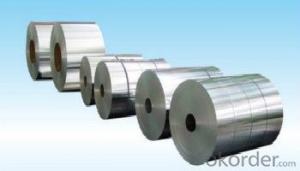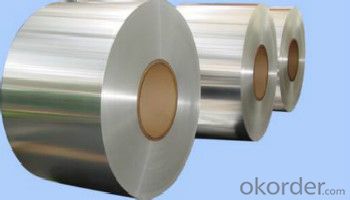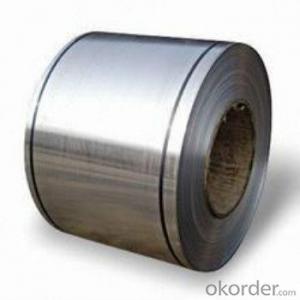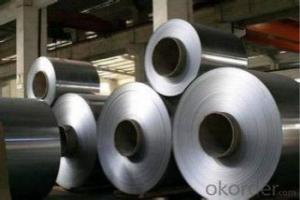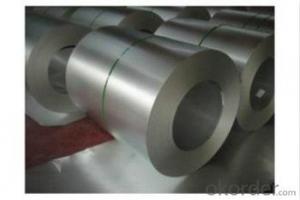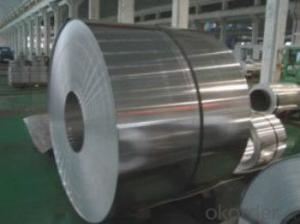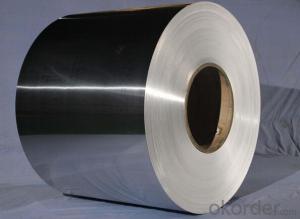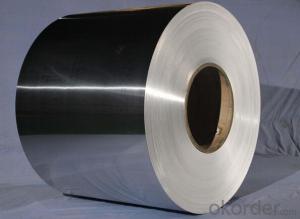Aluminum Alloy Coil - Mill Finished AA3003 Temper H24
- Loading Port:
- Shanghai
- Payment Terms:
- TT or LC
- Min Order Qty:
- 3 m.t.
- Supply Capability:
- 3000 m.t./month
OKorder Service Pledge
OKorder Financial Service
You Might Also Like
Specification
1. Aluminum Coil Description:
Aluminum coil, is a rolled product, produced in a coiled form of continuous strip, and having an ID (Inner diameter) and OD (Outer diameter).Common alloy coil are used for a wide variety of applications, alloy 1050, 1060, 3003, 3105, 3005, 5052, 5754, 5083, 6061, 8011, 8021, and so on, in thickness from 0.0065-7mm, in width from 300- 2200mm.
Aluminium coil can be deep processed into aluminium foilstock, aluminium circle, aluminium coating products, aluminium ceiling, aluminium plastic composite panel (APCP), aluminium embossed products, etc.
2.Main Features of the Aluminum Coil:
• Great ductility
• Heat conductivity
• Anti-corrosion
• Moisture resistanve
3.Aluminum Coil Images
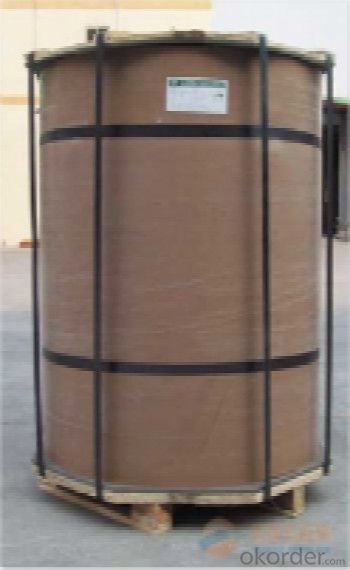
4.Aluminum Coil Specification
Aluminum Coil/Sheet | |
Main Specification | |
Alloy | AA1xxx (AA1050, AA1060, AA1070, AA1100 etc.) |
AA3xxx (AA3003, AA3004, AA3005, AA3105 etc.) | |
AA5xxx, AA6XXX (AA5052,AA5083, AA5754, AA6061, AA6062 etc.) | |
AA8xxx(AA8011, AA8006, AA8079 etc.) | |
Temper | H14,H16, H18, H22, H24, H26, H32,O/F |
Thickmess | ≥0.2mm |
Width | 30mm-2100mm |
Standard | GB/T 3880-2006 |
Special specification is available on customer's requirement | |
5.FAQ
We have organized several common questions for our clients,may help you sincerely:
(1) How to guarantee the quality of the products?
We have established the international advanced quality management system, every link from raw material to final product. we have strict quality test; we resolutely put an end to unqualified products flowing into the market. At the same time, we will provide necessary follow-up service assurance.
(2) MOQ?
For trail order, we accept 3 MT.
(3) Payment term?
30% deposit, balance against the BL copy; 100% L/C at sight
(4) What is the delivery time?
Depends on actual order, around 30 to 35 days
- Q: What is the shear strength of aluminum coils?
- The shear strength of aluminum coils varies depending on the specific alloy and temper. However, on average, aluminum coils have a shear strength ranging from 110 MPa to 190 MPa.
- Q: What are the potential applications of coil-anodized aluminum coils?
- Coil-anodized aluminum coils have a wide range of potential applications due to their unique properties and advantages. Here are some of the key potential applications: 1. Architectural: Coil-anodized aluminum coils can be used in architectural applications such as cladding, roofing, and facades. The anodized coating provides enhanced durability, weather resistance, and color stability, making it suitable for exterior use in different climates. The coils can also be shaped and formed into various architectural elements, offering design flexibility. 2. Transportation: The lightweight nature of coil-anodized aluminum makes it ideal for transportation applications. It can be used for manufacturing parts and components in automotive, aerospace, and marine industries. The anodized coating enhances the corrosion resistance, making it suitable for exterior components and structures. 3. Electronics: Coil-anodized aluminum coils can be utilized in electronics manufacturing. The anodized coating provides excellent electrical insulation, which is crucial in applications requiring high conductivity and insulation. It can be used for manufacturing components like heat sinks, casings, and connectors. 4. Signage and displays: The vibrant and long-lasting colors obtained through coil-anodizing make it an ideal material for signage and displays. The anodized coating ensures color stability against UV radiation and harsh weather conditions, making it suitable for both indoor and outdoor applications. It allows for the creation of eye-catching and durable signage and displays. 5. Furniture and interior design: Coil-anodized aluminum coils can be used in the manufacturing of furniture and interior design elements. The anodized coating provides a smooth, durable, and scratch-resistant surface, making it suitable for applications like tables, chairs, wall panels, and decorative elements. The wide range of available colors and finishes allows for versatile design possibilities. 6. Industrial applications: Coil-anodized aluminum coils can find applications in various industrial sectors. The anodized coating provides enhanced corrosion resistance, which is beneficial in industries like chemical processing, food processing, and pharmaceuticals. It can be used for manufacturing tanks, containers, and equipment that require resistance against harsh chemicals and environments. 7. Energy and sustainable applications: The lightweight nature and durability of coil-anodized aluminum make it suitable for energy and sustainable applications. It can be used in manufacturing solar panels, heat exchangers, and other energy-related components. The anodized coating provides protection against weathering and corrosion, ensuring long-term performance. Overall, the potential applications of coil-anodized aluminum coils are extensive and diverse, ranging from architectural and transportation to electronics, signage, furniture, industrial, and energy sectors. The unique combination of lightweight, durability, color stability, and corrosion resistance makes it a versatile material for various industries and applications.
- Q: What is the corrosion resistance of aluminum coils in saltwater environments?
- Saltwater environments do not pose a problem for aluminum coils as they possess outstanding resistance to corrosion. This is primarily due to the creation of a protective oxide layer on the aluminum surface, effectively acting as a shield against corrosion. By forming a barrier, this oxide layer prevents direct contact between the aluminum and saltwater, significantly reducing the likelihood of corrosion. Furthermore, aluminum itself has inherent resistance to saltwater corrosion as it is a relatively inert metal. Consequently, aluminum coils are widely utilized in various marine applications, including boat hulls, offshore structures, and saltwater cooling systems. Nevertheless, it is crucial to acknowledge that prolonged exposure to saltwater can still result in some degree of corrosion over time. To enhance the durability and performance of aluminum coils in saltwater environments, regular maintenance and suitable protective coatings are advised.
- Q: What specific tools are required for handling and working with aluminum coils?
- <p>Working with aluminum coil typically requires specialized tools to ensure safety and efficiency. Essential tools include a coil cutter for precise cutting, a coil car for easy transportation, and a decoiler for unrolling the coil. Additionally, protective gloves and safety glasses are crucial for personal protection. For more complex tasks, a shear machine or press brake may be necessary for shaping the aluminum. Always follow safety guidelines and use the appropriate tools for the job to prevent accidents and ensure quality work.</p>
- Q: I was wondering if you could mold clay into a sphere then fill it with aluminum. Then put it over a fire and wait until the aluminum melts then put it in a freezer and it would come out as a sturdy, aluminum sphere. Thanks!
- Do not try this at home! Seriously, this is exactly the kind of process that is used for casting metals. However, you need to have very strong molds with no cracks in them. Also, aluminum presents special problems. Solid aluminum does not corrode the way iron does, because it very quickly forms a protective tough layer of aluminum oxide. But molten aluminum can catch fire, with devastating consequences.
- Q: Why do we need aluminum when cooking in the oven at all.
- Foil keeps meat from drying out and hastens cooking time. Also keeps juices from spattering all over the inside of your oven. Plus, when you line a pan with foil, easier to clean pan, especially if you are baking something like cheesy scalloped potatoes.
- Q: What does 1060 stand for in 1060 aluminum rolling?
- It means the aluminum content should be above 99.6%.
- Q: Are there any specific guidelines for the installation of aluminum coils?
- Yes, there are specific guidelines for the installation of aluminum coils. When installing aluminum coils, it is important to follow manufacturer's instructions and adhere to industry standards. Some specific guidelines for the installation of aluminum coils include: 1. Proper handling: Aluminum coils should be handled with care to prevent damage. It is recommended to use gloves and avoid dropping or dragging the coils during installation. 2. Compatibility: Ensure that the aluminum coils are compatible with the HVAC system you are installing. Consider factors such as coil size, capacity, and refrigerant type. 3. Coil orientation: Pay attention to the correct orientation of the coil during installation. This includes ensuring that the airflow direction matches the system's requirements. 4. Alignment: Proper alignment of the aluminum coil is crucial for efficient operation. Make sure the coil is level and securely attached to the mounting brackets. 5. Condensate drainage: Ensure that the condensate drain pans and lines are properly installed and functioning. This helps in preventing water leakage and potential damage. 6. Electrical connections: Follow electrical guidelines provided by the manufacturer to ensure proper wiring and connections for the aluminum coil. 7. Insulation: Insulate the refrigerant lines and ductwork as required to prevent condensation and improve energy efficiency. 8. Clearances: Maintain adequate clearances around the aluminum coil for proper airflow and service access. This includes ensuring that there is enough space for cleaning and maintenance. 9. Testing: After installation, perform necessary tests and inspections to ensure the aluminum coil is functioning properly. This may include checking for refrigerant leaks, verifying proper airflow, and testing the system's performance. It is important to consult the manufacturer's installation instructions and any applicable building codes or regulations before installing aluminum coils. Following these specific guidelines will help ensure a successful installation and optimal performance of the aluminum coils.
- Q: Are aluminum coils suitable for electrical transformers?
- Yes, aluminum coils are suitable for electrical transformers. Aluminum is a lightweight and cost-effective material that offers several advantages for transformer construction. It has excellent electrical conductivity, comparable to copper, which allows for efficient power transfer. Additionally, aluminum coils have lower resistance than copper coils, resulting in reduced power losses and improved energy efficiency. The use of aluminum coils in transformers also contributes to weight reduction, making them easier to handle and transport. However, aluminum coils require larger cross-sections compared to copper coils due to their slightly lower conductivity. This means that transformers using aluminum coils may be slightly larger in size. Overall, aluminum coils are a viable and widely used alternative to copper coils in electrical transformers, offering cost savings, high conductivity, and improved energy efficiency.
- Q: What are the different coil winding methods for aluminum coils?
- There are several different coil winding methods for aluminum coils, each with its own advantages and suitability for specific applications. 1. Layer winding: This method involves winding the aluminum wire in a single layer around the coil mandrel. It is commonly used in low voltage applications and provides good thermal conductivity and heat dissipation. 2. Random winding: In this method, the aluminum wire is wound randomly around the coil mandrel, without any specific pattern. It is often used in high voltage applications, as it helps to reduce the risk of corona discharge and provides better insulation. 3. Concentric winding: As the name suggests, concentric winding involves winding the aluminum wire in concentric circles around the coil mandrel. This method is suitable for applications where space is limited, as it allows for a higher number of turns in a compact coil. 4. Interleaved winding: Interleaved winding involves winding multiple layers of aluminum wire in an interleaved pattern. This method helps to reduce the overall size of the coil while maintaining a high number of turns and increasing the inductance. 5. Helical winding: In helical winding, the aluminum wire is wound in a helix pattern, either at a constant pitch or with varying pitch. This method is often used in applications where a high inductance is required, such as inductors and transformers. 6. Sectional winding: Sectional winding involves dividing the coil into multiple sections and winding each section separately. This method is commonly used in large-scale applications, as it allows for easier handling and installation of the coil. Each of these coil winding methods has its own strengths and considerations, and the choice of method depends on factors such as the specific application requirements, space limitations, and desired electrical characteristics.
Send your message to us
Aluminum Alloy Coil - Mill Finished AA3003 Temper H24
- Loading Port:
- Shanghai
- Payment Terms:
- TT or LC
- Min Order Qty:
- 3 m.t.
- Supply Capability:
- 3000 m.t./month
OKorder Service Pledge
OKorder Financial Service
Similar products
Hot products
Hot Searches
Related keywords
